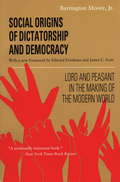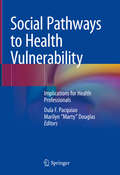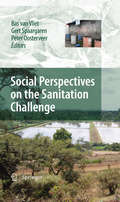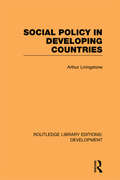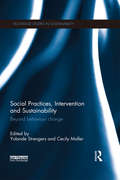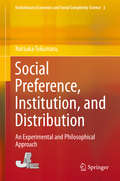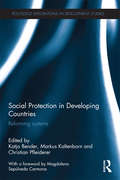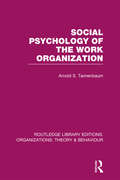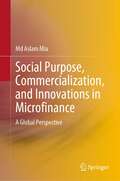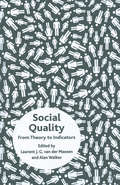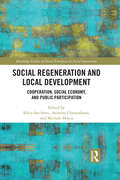- Table View
- List View
Social Organizations: Interaction Inside, Outside and Between Organizations
by Professor Goran AhrneIn this lively and wide-ranging essay, Göran Ahrne sketches an organizational theory of society. Combining the insights of organization theory with the traditional concerns of social theory, he makes an innovative and creative contribution to both fields. Using a broad definition of organizations, the author shows that what goes on inside, outside and among organizations is central to understanding social relations. Organizations provide people with resources and motives, and they set the frames for human action. Although organizations do not form societies or systems, society is shaped and changed through interaction between organizations. Drawing on various schools of organization theory, including institutional, ecological and contingency theories, the book shows how their synthesis with social theory clarifies the nature and effects of organizational interactions.
Social Origins of Dictatorship and Democracy
by Barrington Moore Jr.A landmark in comparative history and a challenge to scholars of all lands who are trying to learn how we arrived at where we are now. "-New York Times Book Review""
Social Participation in Water Governance and Management: Critical and Global Perspectives
by Eric Mollard Kate A. BerrySocial participation in water management and governance recently became a reality in many economies and societies. Yet the dimensions in which power regulation, social equity and democracy-building are connected with participation have been only tangentially analyzed for the water sector. Understanding the growing interest in social participation involves appreciating the specificity of the contemporary period within its historic and geographic contexts as well as uncovering larger political, economic and cultural trends of recent decades which frame participatory actions. Within a wide variety of cases presented from around the world, the reader will find critical analyses of participation and an array of political ecological processes that influence water governance. Sixteen chapters from a diverse group of scholars and practitioners examine water rights definition, hydropower dam construction, urban river renewal, irrigation organizations, water development NGOs, river basin management, water policy implementation and judicial decision-making in water conflicts. Yet there are commonalities in participatory experiences across this spectrum of water issues. The book's five sections highlight key dimensions of contemporary water management that influence, and in turn are influenced by, social participation. These sections are: participation and indigenous water governance; participation and the dynamics of gender in water management; participation and river basin governance; participation and implementation of water management and participation and the politics of water governance.
Social Partnership at Work: Workplace Relations in Post-Unification Germany (Routledge Library Editions: The German Economy #4)
by Carola M. FregeThis book, originally published in 1999, provided the first comparative, in-depth analysis of workplace relations in east and west Germany. The collapse of communism and the ensuing process of reform means that East Germany provides a particularly interesting case, having experienced rapid and radical political and economic transformation, and representing an historically outstanding experiment of the shifting of an entire social system onto a different society. This book examines the success of the institutional transfer of west German labour organisations into east Germany workplaces and addresses central questions such as : Can capitalist labour institutions be imposed on a former communist workforce? What conditions determine the success or failure of these institutions? Can 'social partnership/ between capital and labour be learned?
Social Partnerships and Responsible Business: A Research Handbook
by M. May Seitanidi Andrew CraneCross-sector partnerships are widely hailed as a critical means for addressing a wide array of social challenges such as climate change, poverty, education, corruption, and health. Amid all the positive rhetoric of cross-sector partnerships though, critical voices point to the limited success of various initiatives in delivering genuine social change and in providing for real citizen participation. This collection critically examines the motivations for, processes within, and expected and actual outcomes of cross-sector partnerships. In opening up new theoretical, methodological, and practical perspectives on cross-sector social interactions, this book reimagines partnerships in order to explore the potential to contribute to the social good. A multi-disciplinary perspective on partnerships adds serious value to the debate in a range of fields including management, politics, public management, sociology, development studies, and international relations. Contributors to the volume reflect many of these diverse perspectives, enabling the book to provide an account of partnerships that is theoretically rich and methodologically varied. With critical contributions from leading academics such as Barbara Gray, Ans Kolk, John Selsky, and Sandra Waddock, this book is a comprehensive resource which will increase understanding of this vital issue.
Social Pathways to Health Vulnerability: Implications for Health Professionals
by Marilyn Marty" Douglas Dula F. PacquiaoPrimarily intended for DNP and PhD students in nursing and health care who are expected to design research to identify health-related problems and solutions, this book focuses on the concepts, theories and processes of how social determinants affect the health of populations. Using specific social determinants as an organizing framework, it presents ample scientific evidence from health and social disciplines of the universal processes that produce the social patterning of health inequities. This book is organized into three major parts, beginning with the social pathways to health vulnerability, followed by research methods and subsequently frameworks for action. The methods section provides selected research approaches suitable for studying the impact of social variables on population health, as well as the outcomes of multilevel interventions. Each chapter provides an in-depth presentation of relevant theoretical knowledge and research-based examples of work conducted in the area. The book addresses the specific implications for health professional leaders such as nurses or health policy makers, highlighting their role in achieving macrosocial changes to promote health among specific vulnerable populations. Both of the book’s editors are prominent and highly respected scholars in their field. The team of authors is highly multidisciplinary, including experts from the fields of medicine, public health, education and epidemiology who have conducted research on the social determinants of population health. Combining their varied perspectives, this book offers a valuable resource for graduate students (PhD, MD, DNP, MSN, etc.), faculty, researchers and clinicians in health professions.
Social Perspectives on the Sanitation Challenge
by Gert Spaargaren Peter Oosterveer Bas Van VlietThis collection presents a timely collection of social scientific papers dealing with innovative sanitation issues and concepts, perceptions and decision-making support. It comprises a valuable resource for political scientists, environmental engineers and urban planners involved in the study, design and implementation of sanitation projects worldwide and whose work relates to meeting the ambitious Millennium Development Goal of halving, by 2015, the number of people without sustainable access to safe drinking water and basic sanitation. In developed countries the sanitation challenge is to initiate a transition from strongly centralized, water-based infrastructure regimes towards more sustainable, source-separation oriented, sanitation regimes. This calls for social scientific research and demonstration on different levels and scales, including concept development, institutional learning and governance building. In the developing world the sanitation challenge is to provide sanitation services to the poor and the very poor, without compromising on sustainability. New configurations employing the best practices of sanitation technology and management for rural and urban contexts are needed. The sanitation challenge in both worlds is to go beyond traditional dichotomies between 'small, appropriate' and 'modern/advanced' technologies and to develop rural and urban sanitation with a mix of scales, strategies, technologies, payment systems and decision-making structures, that better fit the physical and human systems for which they are designed. This volume is unique in its presentation of social scientific research findings from urban planners, sociologists, economists, political scientists and environmental engineers who are involved in international sanitation research and implementation. Theoretically the volume include insights from Science and Technology Studies, Environmental Sociology and Urban Studies. Its empirical scope stretches from sanitation projects in Western Europe to Sub-Saharan Africa.
Social Policy in Developing Countries (Routledge Library Editions: Development)
by Arthur LivingstoneThis reissue, first published in 1969, is a study of contemporary social policy in developing countries, which places the emphasis upon the human needs and requirements for social change which confront any people and any government, wherever their political and international affiliations lie, whatever their economic and social convictions may be.
Social Practices, Intervention and Sustainability: Beyond behaviour change (Routledge Studies in Sustainability)
by Yolande Strengers Cecily MallerIn an era of dramatic environmental change, social change is desperately needed to curb burgeoning consumption. Many calls to action have focused on individual behaviour or technological innovation, with relative silence from the social sciences on other modes and methods of intervening in social life. This book shows how we can go beyond behaviour change in the pursuit of sustainability. Inspired by the ‘practice turn’ in consumption studies, this interdisciplinary book looks through the lens of social practice theory to explore important and timely questions about how to intervene in social life. It discusses a range of applied sustainability topics including energy consumption, housing provision, water demand, transport, climate change, curbside recycling and smart grids, seeking to redefine what intervention is, how it happens, and who or what can intervene to address the growing list of environmental calamities facing contemporary societies. These issues are explored through a range of specific case studies from Australia, the UK and the US, providing theoretical insights that are of international relevance. The book will be of interest to researchers and students in the fields of sociology, consumption studies, environmental studies, geography, and science and technology studies, as well as policy makers and practitioners seeking to intervene in social life for sustainability.
Social Preference, Institution, and Distribution
by Natsuka TokumaruThis is the first book to examine behavioral theories on social preference from institutional and philosophical perspectives using economic experiments. The experimental method in economics has challenged central behavioral assumptions based on rationality and selfishness, proposing empirical evidence that not only profit seeking but also social preferences matter in individuals' decision making. By performing distribution experiments in institutional contexts, the author extends assumptions about human behavior to understand actual social economy. The book also aims to enrich behavioral theories of economics directed toward institutional evolution. The author scrutinizes how specific institutional conditions enhance or mute individuals' selfish incentives or their fairness ideals such as egalitarian, performance-based, labor-value radicalism or libertarianism. From experimental results and their analysis, implications for actual problems in social economy and institutional change are derived: why performance-based pay often fails to promote workers' productivity; why labor wages decline whereas shareholder's values increase after financialization; and whether socially responsible investment can be a social institution for corporate governance. The book is also addressed to philosophers of social sciences interested in how experimental methods can contribute to developing cognition of human behaviors and be extended to social theories. Referring to behavioral theorists in the history of economic thought, the author discusses the meanings of experiments in the methodology of social sciences. She also proposes new ways of interpreting experimental results by reviving historic social theories and applying them to actual social problems.
Social Problems in the UK: An Introduction
by Stuart IsaacsSocial Problems in the UK: An Introduction contextualises the most pressing social problems of our times drawing upon the disciplines of sociology, social policy, education studies and health studies. This much-needed textbook brings together a comprehensive range of expertise in the applied social sciences to discuss the social myths and moral panics that surround many popular debates. This is an accessible text that carefully guides students through the methodology of social construction and related theories to introduce key topics in the areas of: ‘Race’ and ethnicity The future of work Poverty and homelessness Inequalities in education Health, public health and mental health Ageing and the ‘third age’ This completely revised and up-to-date second edition covers the most urgent social issues facing the UK today, including an analysis of the Black Lives Matter movement, the Covid-19 health crisis and the new ‘gig’ economy. The second edition maintains the accessible style and easy-to-read format of the first edition, integrated with Key Points and Further Reading elements to further aid student learning. Situated firmly in the new post-pandemic, post-Brexit world, this text contains new chapters on all the most pressing questions raised in the media and in public debates. It will help readers understand the background and broader context of the UK’s key social problems.
Social Procurement and New Public Governance (Routledge Critical Studies in Public Management)
by Josephine Barraket Robyn Keast Craig FurneauxIn recent years, the search for innovative, locally relevant and engaging public service has become the new philosophers’ stone. Social procurement represents one approach to maximising public spending and social value through the purchase of goods and services. It has gained increasing attention in recent years as a way that governments and corporations can amplify the benefits of their purchasing power, and as a mechanism by which markets for social enterprise and other third sector organisations can be grown. Despite growing policy and practitioner interest in social procurement, there has been relatively little conceptual or empirical thinking published on the issue. Taking a critically informed approach, this innovative text examines emerging approaches to social procurement within the context of New Public Governance (NPG), and examines the practices of social procurement across Europe, North America, and Australia. Considering both the possibilities and limitations of social procurement, and the types of value it can generate, it also provides empirically-driven insights into the practicalities of ‘triple bottom line’ procurement, the related challenges of measuring social value and the management of both the strategic and operational dimensions of procurement processes. As such it will be invaluable reading for all those interested in social services, public governance and social enterprise.
Social Protection Goals in East Asia: Strategies and Methods to Generate Fiscal Space (Routledge-ERIA Studies in Development Economics)
by Mukul G. Asher Fauziah Zen Astrid DitaThe book examines the conceptual, economic, and fiscal impact(s) of the Social Protection Floor (SPF) initiative of the International Labor Organisation (ILO) and other policy influencers by first critically examining the methodologies used by the international agencies to estimate the fiscal costs of designated minimum package(s) of social protection programs. The book also briefly reviews the methodologies used and usefulness of the Social Protection Index (SPI) of the Asian Development Bank (ADB). Second, the book analyses strategies and specific initiatives used by the selected East Asian countries (China, India, Indonesia, the Philippines, Thailand, and Vietnam), designed to progress towards the social protection goals underlying the Social Development Goals (SDGs) adopted by the United Nations in September 2015, and endorsed by the countries covered in this book. Finally, the book provides a framework for generating fiscal space to fund the social protection programs and initiatives. The country chapters utilise this framework in the context of each specific country to suggest generating fiscal space.
Social Protection Policies in South Asia
by Neera Chandhoke; Sanjay Kumar AgrawalThis book offers a comparative analysis of social protection policies in five countries of South Asia — India, Sri Lanka, Pakistan, Nepal and Bangladesh — where economic transformation impelled by globalisation and liberalisation has, on the one hand, caused an unprecedented expansion of the informal sector, and heightened the vulnerabilities of its workers on the other. It examines the multiple vulnerabilities of workers who continue to work and live in abysmal conditions, with persistent cutbacks in social security budgets by governments, and evaluates the implementation and efficacy of current policies.The volume introduces the problem through an overview of South Asian economies by charting out the contrasting parallels between growth paths and the extent of poverty among workers in the informal sector. Further, it assesses the projected cost of basic social protection in these economies in the context of different (possible) growth scenarios. The second part of the book discusses the experiences from various countries by highlighting work force composition, ratio of workers in the informal sector to total work force, challenges and concerns, available policies and programmes, and finally, the outreach of these programmes. The concluding section argues for the need for social protection in South Asia by exposing the limitations of existing policies, and proposes a future course of action in order that social protection may serve as a tool in the transformation of social policy.This will be useful to scholars, students and researchers of development studies, economics, politics and labour law. It would also interest those in voluntary sector organisations, nongovernmental organisations, policy makers, journalists and think tanks.
Social Protection for Africa’s Children (Routledge Studies In Development Economics Ser. #86)
by Sudhanshu HandaSocial protection is an increasingly important part of the social policy dialogue in Africa, and yet because of its relatively new place in a rapidly evolving agenda, evidence on critical design choices such as targeting, and on impacts of social protection interventions, is mostly limited to case studies or small, unrepresentative surveys. This impressive collection makes a major contribution to building the evidence base, drawing on rigorous analysis of social protection programmes in several African countries, as well as original research and thinking on key topical issues in the social protection discourse. Social Protection for Africa’s Children is divided into four parts. The first presents economic and human-rights based right arguments for social protection as an integral part of the social policy menu in Africa. This is followed by a part on targeting, which highlights some of the key policy trade-offs faced when deciding between alternative target groups. The third part presents rigorous quantitative evidence on the impact of social cash transfers on children from programmes in South Africa, Malawi and Ethiopia and the final part addresses a set of issues related to social justice and human rights. This book significantly advances existing knowledge about social protection for children in Africa, both conceptually and empirically. It makes a strong case for social protection interventions that address the short term (amelioration) and long term (structural) needs of children, and shows that programming in this sector for children is both feasible and achievable. Policy makers and practitioners in this sector will have, in this book, the theoretical and empirical evidence necessary to advance social protection for Africa’s children in the decades to come. Furthermore, this book should be an essential resource to postgraduates and students focussing on development economics in Africa.
Social Protection in Developing Countries: Reforming Systems (Routledge Explorations in Development Studies)
by Markus Kaltenborn Katja Bender Christian PfleidererProviding universal access to social protection and health systems for all members of society, including the poor and vulnerable, is increasingly considered crucial to international development debates. This is the first book to explore from an interdisciplinary and global perspective the reforms of social protection systems introduced in recent years by many governments of low and middle-income countries. Although a growing body of literature has been concerned with the design and impact of social protection, less attention has been directed towards analyzing and explaining these reform processes themselves. Through case studies of African, Asian, and Latin American countries, this book examines the ‘global phenomenon’ of recent social protection reforms in low and middle-income areas, and how it differs across countries both in terms of scope and speed of institutional change. Exploring the major domestic and international factors affecting the political feasibility of social protection reform, the book outlines the successes and failures of recent reform initiatives. This invaluable book combines contributions from both academics and practitioner experts to give students, researchers and practitioners in the fields of social security, economics, law and political science an in-depth understanding of political reform processes in developing countries.
Social Protection in Latin America: Causality, Stratification and Outcomes (Global Dynamics of Social Policy)
by Armando BarrientosThis book offers a comprehensive analysis of social protection in Latin America, its origins, institutions, and outcomes. The chapters are organised in three groups. The earlier chapters discuss in turn appropriate methods, an analytical framework, and core institutions. The book advocates a causal inference approach to the study of the institutions that have dominated social protection in the region: occupational insurance, individual retirement savings, and social assistance. The middle chapters study social protection’s main stratification effects, focussing on stratification effects on employment, protection, and worker incorporation. The later chapters then assess social protection outcomes and identify country groupings including their evolution over time. The book, and its approach and findings, contributes to the advancement of a theory of social protection amongst late industrialisers.This is an open access book.
Social Protest and Conflict in Radical Neoliberalism: Chile, 2008–2020 (Latin American Political Economy)
by Alfredo Joignant Nicolás M. SommaThis book analyzes collective protests and contentious politics in Chile over a span of 13 years. Utilizing an unprecedented database developed by the Centre for Social Conflict and Cohesion Studies (COES), twenty social scientists provide a systematic overview of conflicts between 2008 and 2020 in the so-called “laboratory of neoliberalism”. Readers will understand different aspects of social protest in Chile in the realms of labor, student activism, pension issues, as well as contentious episodes regarding gender rights, socio-territorial mobilizations, conflicts over memory, and the thorny Mapuche question. Readers will also discover spectacular findings about the popular rebellion of 2019 as well as an inventory of contentious mechanisms and tactical repertoires routinely employed by Chilean civil society groups.
Social Psychology and Economics (The Society for Judgment and Decision Making Series)
by J. Keith Murnighan Marcel Zeelenberg David De CremerThis book combines chapters written by leading social psychologists and economists, illuminating the developing trends in explaining and understanding economic behavior in a social world. It provides insights from both fields, communicated by eloquent scholars, and demonstrates through recent research and theory how economic behaviors may be more effectively examined using a combination of both fields. Social Psychology and Economics comes at a particularly fitting time, as a psychological approach to economics has begun to flourish in recent years, and papers exploring the intersection of these two disciplines have appeared in peer-reviewed journals, opening a dynamic dialogue between previously separated fields. This volume, the first in the Society for Judgment and Decision Making Series since acquired by Psychology Press, includes chapters by economists and psychologists. It addresses a variety of economic phenomena within a social context, such as scarcity and materialism, emphasizing the importance of integrating social psychology and economics. Social Psychology and Economics is arranged in seven parts that discuss: an introduction to the topic; preferences, utility, and choice; emotions; reciprocity, cooperation, and fairness; social distance; challenges to social psychology and economics; and collaborative reflections and projections. The market for this book is students, researchers, and professionals in the disciplines of economics, psychology, business, and behavioral decision making. Graduate students and upper-level undergraduate students will consider it a useful supplemental text.
Social Psychology and Organizations: Advances In Theory And Research (Organization and Management Series)
by J. Keith Murnighan Rolf Van Dick David De CremerThis book is one of the first to provide an overview of recent developments in social psychological theory as it applies to organizational issues. It brings together outstanding scholars whose research touches the interfaces of social psychology , IO psychology and organizational behavior. Social psychology deals with social interactions between individuals and groups. As individuals populate, run, and confuse (!) organizations, analyzing individual behavior and interpersonal interactions is critical for understanding organizational effectiveness and success, as well as individual satisfaction and well-being. The chapters in this volume address the critical topics for current and future organizational life such as prosocial and antisocial behavior, ethics, trust, creativity, diversity, stress, conflict, power and leadership and many more.
Social Psychology of the Work Organization (Routledge Library Editions: Organizations)
by Arnold TannenbaumThis book discusses social psychological research in organizations and illustrates the implications of this research for organizational theory and practice. The book focuses on the relationship of man to the organization in which he works; his sense of satisfaction, involvement, feelings of identification or loyalty, conflicts, and tensions – as well as his effort in support of, or opposition to, the formally defined goals of the organization.
Social Purpose Enterprises
by Jack Quarter Sherida Ryan Andrea ChanSocial Purpose Enterprises: Case Studies for Social Change presents case studies of twelve organizations that operate in a growing niche within the Canadian social economy: market-based entities supported by a nonprofit organization and operated for the benefit of a workforce who lives on the margins of society.Using a variety of research methods, the contributors examine the work of social purpose enterprises in a range of businesses including food service, child care, furniture, courier services, and microfinance. Combining the experience of academics and practitioners, each chapter analyses the economic, social, and policy implications of the case.Building on research published in Researching the Social Economy (2010) and Businesses with a Difference (2013), Social Purpose Enterprises provides a valuable resource for those involved in the growing push to encourage market-based solutions for those on the social margins.
Social Purpose, Commercialization, and Innovations in Microfinance: A Global Perspective
by Md Aslam MiaThis book analyses three key aspects of microfinancing, namely social purpose, commercialization and innovations and examines, through a global perspective, how these aspects helped and diverted microfinance institutions towards the attainment of their dual goals over the last twenty years. Since microfinance remains informal in nature for most economies, not all financial innovations are suitable for its needs. Hence, the arguments in the book put forth an important challenge to the advocates of innovations and subsequently highlight why MFIs should be cautious when integrating innovations to ensure its original promise. The book is based on empirical analysis by utilising the latest and global microfinance market data, rather than focusing on a specific region. Thus, the book bridges a gap in knowledge by unravelling detail of the social purpose, commercialization and innovations within the field of microfinance and will be a valuable resource for those exploring the dynamics of innovations in microfinance.
Social Quality: From Theory to Indicators (Studies In Employment And Social Policy Ser. #Vol. 7)
by Alan Walker Laurent J. G. van der MaesenThis collection sets out the latest research on the concept of 'social quality', developing its theoretical foundations and applying it to pressing policy issues such as the future of the European Union and sustainable global development.
Social Regeneration and Local Development: Cooperation, Social Economy and Public Participation (Routledge Studies in Social Enterprise & Social Innovation)
by Asimina Christoforou Silvia Sacchetti Michele MoscaSocial regeneration is about the transformative processes that, through institutional choices that embody cooperation and inclusion, develop opportunities and capabilities for weak categories, and transversally for society. The challenge of social regeneration can be addressed, in part, through organisational solutions increasingly identified with social economy organisations, since they are characterised by a social objective, cooperation and inclusive democratic governance. Besides the organisational element, Social Regeneration and Local Development provides a new perspective on interacting socio-economic factors, which can work in synergy with the social economy organisations model to promote and sustain social regeneration and well-being. Such elements include civic engagement and social capital, the nature of the welfare system, the use of physical assets in urban and rural areas, leadership, technology, and finance. By analysing organisational and contextual elements, this book offers an institutional perspective on how socio-economic systems can reply to challenges such as social and environmental degradation, financial crises, immigration, inequality, and marginalisation.

